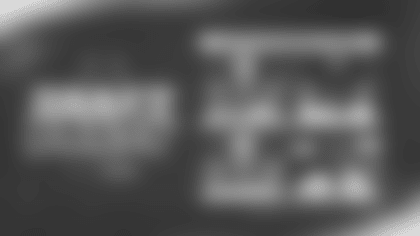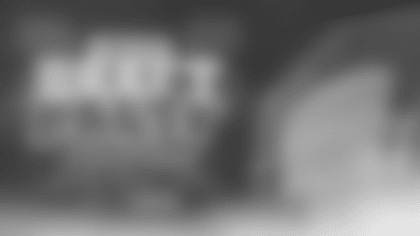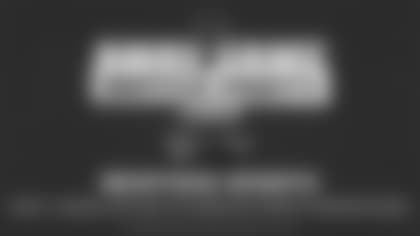DEFENSIVE COORDINATOR LARRY COYER (opening comments) * *
"I am really honored to be here with Jim Caldwell, and it's personal as much as professional. (Our relationship goes) way back to the 70s. He played for me (at Iowa). He's an ultimate character guy, and he proved it in 1976 against Penn State. That was when they were really good and Iowa was really bad, and we were in the transition of trying to build a football team. We had to go over there and play that '76 Penn State team, and he stood up—this is a quiet man, Jim Caldwell is a quiet man—and talked about that nobody can make you feel inferior. He did it in such a way that was unbelievable, how he talked to our football team. And we beat that team, 7-6. One of the greatest displays of defensive courage I've ever seen. That's the kind of guy he was. He was about character and he was about fighting and he was about establishing his way of doing things in a quiet way. I respect that and that's why I'm honored to work with him, because I know what he's going to do and I know he's going to be straight up and straight at you."
DEFENSIVE COORDINATOR LARRY COYER (on how much change can be expected given the personnel set to return)
"I've been fortunate enough now to coach in two or three different organizations and we've always had personnel that's good enough to win. So I think our personnel is good enough to win, and I think what that personnel can do is up to our ability as teachers. That's what we are as coaches, is teachers and communicators. If we want to tweak something we can do it. It comes back to communication and accountability. My whole job is to give our team the best chance we can give them to win, that's it. Whatever we need to do to do that, we're going to do."
DEFENSIVE COORDINATOR LARRY COYER (on his coaching style, if he is quiet or rah-rah)
"I'm passionate about football. I've been blessed. I've been coaching football since 1965. That's what I want to do. That's my goal. That's all I've ever wanted to do. And I'm passionate about it, I love it. I prefer to be enthusiastic, positive. I hope our guys are passionate about it, enthusiastic and positive. I want to talk about what we can do, not what we can't do, how we can get better and not why we made a mistake. Correct the mistake and, 'How can we get better?' That's how I feel about it. I'm eager for challenges. I like challenges. I like to compete."
DEFENSIVE COORDINATOR LARRY COYER (on how much he has been able to look at the defensive roster and see what he has, especially at defensive tackle where the team lost players last year)
"The personnel people are going to do what they have to do to give us a chance to win. You take hits at every area in the National Football League, you do. The big deal is that you have to have people who will step up, however it is, whatever it is, people who step up. This team has done a great job of that. The Colts have done a great job of having guys step up and contribute to this football team. Otherwise, you wouldn't have six straight years with (at least) 12 wins. They've done a great job. The players have done a great job and the personnel people have done a great job. My job is to coach them. They'll give us, I'm sure, the players to win a championship because I know that's what this organization wants."
DEFENSIVE COORDINATOR LARRY COYER (on being named defensive coordinator and having the staff already in place)
"I don't ever worry about that. We're a team, we're professionals. I don't think a coordinator is a dictator. I think a coordinator is what it says, he takes a combination of ideas from intelligent people and puts them to use in an intelligent way. There are a lot of different ways to do it and what I'm trying to do is use all the intelligence on our staff, which is vast…You take all that experience and put it together and you use it. What you come out with is a product that we all agree on. I don't see a coordinator as a dictator, I see it as an organizer to bring ideas together and then put them into place. I think my job is to make sure that we're organized."
ASSISTANT HEAD COACH/WIDE RECEIVERS COACH CLYDE CHRISTENSEN (General comments)
"As you all know this (promotion) was a good opportunity. I wanted to stay here. There's a very similar relationship (with his 1996-2001 tenure at Tampa Bay and his 2002-09 tenure in Indianapolis). I came into the league with Tony (Dungy) and spent the whole time with Tony, and when I became the coordinator there in Tampa we hired Jim Caldwell as the quarterbacks coach. I've just had a great relationship with him. That means a lot to me, just who I work with, who we do it with. That's more important than where or for how much or what title or all those things. I've always believed that. In my 13 years in the NFL, I've found that to be the most important thing. I've tried to stay with that. This will be a great opportunity for me just to keep doing what I'm doing and also maybe assume a little bit more responsibility and see some more of the inner workings, and I'm thankful for the opportunity. I don't see the day-to-day stuff changing a whole bunch but we'll have to see how that goes."
ASSISTANT HEAD COACH/WIDE RECEIVERS COACH CLYDE CHRISTENSEN (on if his responsibilities will change with the expanded title)
"Game day, I think it will be exactly the same thing (as he has done before). I think he may give me some different responsibilities on game day as far as just feeding him some information. I do think it's kind of a feeding-him-some-information type of thing. He may give me three things to get done at the Combine. You know, 'Hey, let's have a discussion on this.' How much are people practicing in pads?' Then I will research that for him and do some of the legwork for him, just where we can have discussion on different topics that are out-of-the-box type of topics."
ASSISTANT HEAD COACH/WIDE RECEIVERS COACH CLYDE CHRISTENSEN (on if the perception of WR-Marvin Harrison would have been different last year with a few more deep completions)
"I think that's the case. I actually did a project will Bill (Polian) about week six or seven (of last season), and I said, 'Here are the facts of the matter.' Marvin had run by a bunch of people. It's like a defensive lineman, it's one of those positions where you are going to run and run and run, and you're going to get 12 balls, and you don't know what play it's coming on. That's the way deep balls are. Sometimes you run by them and there's a sack. Sometimes you run by them and there's pressure and there's a check down. Sometimes run by them and he gets flushed in the wrong direction. I think he did have some bad luck early and we had a couple on the fingertips early in the Chicago game. I would say that."
ASSISTANT HEAD COACH/WIDE RECEIVERS COACH CLYDE CHRISTENSEN (on Defensive Coordinator Larry Coyer)
"Nice guy. I like his presence. I've heard great things about him. I don't know him or have a history with him in any way. (He) seems like a great guy."
SPECIAL TEAMS COORDINATOR RAY RYCHLESKI (on the differences of college versus professional coaching)
"Football is football. I really do believe that. The biggest change (between colleges and the NFL) is in the rules, and I'm definitely a rules guy. There are some different rules in the NFL compared to the college level. Actually, one of the NFL rules has come back to the college level for on-side kicks. A few years ago in the NFL, you could put as many guys on one side (of the kicker) as you wanted to, where in college you could only put six on one and four on another. Actually, the NFL has come back to that rule the colleges had. Another rule is on the punt team. Only two guys can go at the snap of the ball, where as in college, everybody can go if you wanted to. I think that's the biggest difference making sure of being up on the rules and how they affect the special teams as well as the overall game."
SPECIAL TEAMS COORDINATOR RAY RYCHLESKI (on his approach to dealing with players on special teams)
"I say if you want to get up with the upper echelon (of players on an NFL roster), prove your worth. It doesn't matter what you're getting paid, it's what you do on the field. It's like this job (special teams coordinator). It doesn't matter how I got this job, it matters what I do when I'm here. It's the same thing for those specials teams players. It doesn't matter how they get on this football team. What matters is what they do while they are here. Quite obviously, motivation is a part of it, but it's their job. You are either a dilettante or a professional. A dilettante dabbles in his craft. A professional perfects his craft. If their job is special teams, perfect your craft. Make the big tackle."
SPECIAL TEAMS COORDINATOR RAY RYCHLESKI (on having a stake in special teams)
"When you have a stake in it and guys are watching and sitting on the sideline, I'm hoping they are looking and seeing what happens. Let's see what kind of field position we can get out of this. The first play of defense is the punt team and kickoff coverage. It's a lot tougher calling plays inside the 20 than it is at the 30 or more, and the defense realizes that. Hopefully, we can all buy into that. If everybody has a stake in it, they tend to work at it a little bit harder."
QUARTERBACK COACH FRANK REICH (on going from internship to being quarterbacks coach)
"When I came here as an intern to do the training camp thing, sure you're thinking in the back of your mind the perfect scenario would be to do an internship then hook on to an entry-level quality control position then work your way up to be a position coach. Honestly, the way things worked out, it could not have gone any better on many fronts. First of all, organizationally this is just a great place to work for. Secondly, having an opportunity to work for two great head coaches obviously in Tony Dungy and Jim (Caldwell), and, thirdly, as a quarterbacks coach you get to work with Peyton Manning. I'm very thankful for those opportunities."
QUARTERBACK COACH FRANK REICH (on his role leading up to this promotion)
"Last year during the off-season I was doing an internship. It was like I was assistant quarterbacks coach/offensive assistant. I was doing projects for the whole offense, but I was really in many respects an assistant quarterbacks coach. Here in this offense and particularly with all that we do, I found this out during the season that the amount of work that Jim (Caldwell) was doing as the quarterbacks coach was just an immense amount of work. When I came in he was able to dump some of that stuff off on me, which I gladly received because it kind of gave me a feel for what it would be like to coach quarterbacks here. It's the kind of stuff Peyton (Manning) expects and the kind of work he likes done. I've been working with Tom Moore and the offensive coaches to get game plans ready and that whole process. It actually afforded me the opportunity, even though I was doing quality control work, but I was also kind of an assistant position coach. So I got my feet wet actually doing quarterback coaching work."
QUARTERBACK COACH FRANK REICH (on coaching at the NFL level)
"The great thing about coaching at this level and coaching great players is when you get people who want to learn and are hard workers, that's what coaches love the most. Whether you're a teacher or a coach, when you're working with someone who wants to work and who has the capacity to learn and wants to learn, it doesn't get any better than that. Throw on top of that when they have the highest skill level possible, it's a pretty dynamic environment. This is what attracted me to coaching in the NFL, just to be able to work with this level of athlete."
QUARTERBACK COACH FRANK REICH (on his past experience as a player and how that transfers to working with QB-Peyton Manning)
"I still think I'm going to have to prove myself day in and day out. The fact that I've played for a number of years and had a little bit of success, certainly has helped me get here. But just proving it every day on the field and in the meeting room is really where it's going to be at. One of the things I appreciate about Peyton, he has a great respect for this game in general. I really think that's an important part for any NFL player, that you respect the game. I think that Peyton is a model in that regard. In the quarterback fraternity, you respect the guys that have played your position. Many people say it's the hardest position to play in professional sports."













